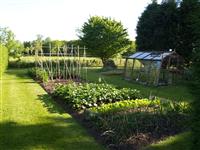Study Organic Plant Culture by Distance Learning.
 Learn to grow plants naturally by working with the natural environment, and avoiding the use of synthetic chemicals.
Learn to grow plants naturally by working with the natural environment, and avoiding the use of synthetic chemicals.- Understand soils and plant nutrition.
- Learn how to manage soils.
- Identify ways to deal with pests and diseases using ecologically sound practices.
"This is a very intensive course that develops your ability to grow and market a range of crops. Grow your own organic crops or advise others. Many opportunities exist in this field as public interest is rapidly increasing. Organic growing is the path to the future." -- Adriana Fraser Cert. Hort., Cert. Child Care., Adv. Cert. App. Mgt., Cert 1V Assessment and Training., Adv. Dip. Hort., ACS Tutor.
Course structure and content
This course has 10 lessons:
1. Introduction
A look at the various organisations that are involved with the organic movement.
2. Plant Culture
Learn about the basis of good plant and soil health with no dig principals and crop rotation.
3. Understanding Soils
If your soil is not good, the plants will not perform. Understand soil profiles, identify soil types, and the
requirements to keep plants healthy.
4. Fertilisers and Plant Nutrition
Organic fertilisers such as manure based ones and how to use them.
5. Soil Management
Green manure crops, cultivation techniques for minimising soil disturbance and composting techniques to enhance the soil.
6. Pests & Diseases
Understanding pests and diseases and environmental problems with organic production.
7. Mulching
This lesson looks at the importance of mulch and methods to use it when producing organic crops.
8. Seeds
Collecting, storing & sowing your own seeds.
9. Vegetable Growing in your locality
The importance of selecting a suitable site and planning your crop. The A-Z of various vegetables you could look at growing.
10. Fruit Growing in your locality
Establishing an orchard and the production aspects to consider. A-Z of various fruit tree types you could look at growing.
AIMS
- Explain the concepts and principles of organic growing, including the common techniques used in organic growing systems.
- Determine soil management procedures, which are consistent with organic growing principles.
- Explain how pests and diseases are controlled using organic growing principles.
- To determine appropriate mulches for use in different organic growing situations.
- Determine the appropriate use of seed propagation, in organic plant culture.
- Plan the production of an organically grown vegetable food crop.
- Plan the production of an organically grown fruit crop.
Benefits of studying organic plant culture
Interest in organically grown gardens and produce has been gaining traction for the past few decades as more and more people question the use of harsh chemicals in horticulture and agriculture. Not only can these chemicals affect natural ecosystems but they can also have residual effects on humans if consumed. Everyone can play a part in protecting the environment whether in the home garden or in other horticultural roles.
This course is suited to people who care about the environment and who are working in:
- Horticulture
- Agriculture
- Environmental protection
- Land care
- Home gardens
Why Study with ACS?
Design your own learning pathway.
Study at your own pace, from anywhere, at any time.
Receive prompt, expert support from our team of committed and friendly tutors.
Your learning is our priority. We are flexible and adaptable to meet your educational needs!
Enrolling is easy - just go to the top of this page and select your study method and payment option.
If you have any questions about studying with ACS, or want to know more about any of our courses, get in touch with our specialist tutors today.
They will be happy to answer your questions and look at different study options to fit in with your goals.